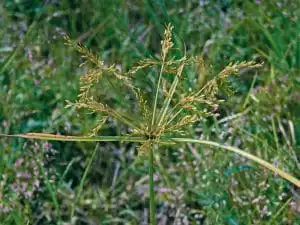Part of the sedge family, yellow nutsedge (Cyperus esculentus) is a perennial that is often mistaken for grass. This invasive weed usually invades lawns in the summer when it grows rapidly and becomes more and more difficult to control once established.
Identifying Yellow Nutsedge
Yellow nutsedge grows upright—sometimes up to 3 feet tall—forming clumps that resemble dense patches of grass. A closer look shows a pointed tip and hairless, triangular-shaped stems. Unlike blades of grass that grow in sets of two, the thick, light-green leaves that grow from its base are arranged in sets of three. The weed produces small clumps of straw-colored flowers in early to late summer when the days have the most hours of sunlight.
Yellow Nutsedge Spread
Believe it or not, yellow nutsedge does not reproduce through the spread of its seed like other weeds. Tubers growing from an elaborate underground network of creeping horizontal stems known as rhizomes are the most frequent reason for an invasion. Rhizomes survive in the soil through the freezing temperatures of winter until the moist conditions of spring arrive. The skin of these rhizomes are covered in a chemical that is activated in moist soil, making swampy, rainy conditions optimal for growth.
Yellow Nutsedge Control
This weed is notoriously difficult to manage because of the rhizomes’ multiple buds, long sprouting period, and resistance to systemic herbicides. Here are a few tips to try.
- Proper maintenance: a healthy, well-fertilized, well-watered lawn with good drainage will grow a thick root system of its own, choking out weeds.
- Prevention: hand pulling can help prevent the spread of this weed—if it’s done early enough in the growing process.
- Early detection: the most effective chemical treatment is with preemergence herbicides. These are designed to enter the shoots and root systems of yellow nutsedge seedlings.
- Herbicides: herbicides designated specifically for yellow nutsedge can be used once the weed has emerged, but rhizomes are often resistant, making repeat applications necessary.
Effectively attacking this lawn weed can require professional assistance. Call us today at 419-529-5296 for assistance in treating your lawn for unwanted weeds.



Comments (0)
Thanks for your comment!
Thanks for your feedback! Your comments have been successfully submitted! Please note, all comments require admin approval prior to display.
Error submitting comment!
There is a problem with your comment, please see below and try again.